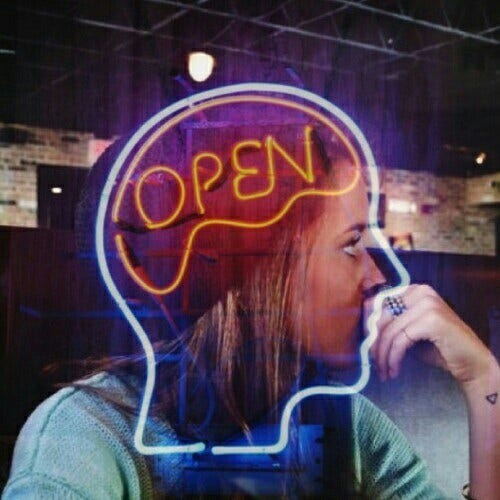What Does Demisexual Mean? 5 Signs You (Or Someone You Love) Needs Emotional Connection To Feel Sexual Attraction
Yes, it's a real thing!
 Krakenimages.com/ Shutterstock
Krakenimages.com/ Shutterstock I consider myself to be an open-minded, well-read person when it comes to human sexuality and sexual orientation — and I have noticed that demisexuality is a serious, hot button issue lately, even in sex-positive circles.
So before we get into the traits of someone who identifies as demisexual and why this sexual identity has people confused, let's define CLEARLY what it means to be demisexual.
The demisexual definition, according to asexuality.org:
"A demisexual is a person who does not experience sexual attraction unless they form a strong emotional connection with someone. It's more commonly seen in but by no means confined to romantic relationships. Nevertheless, this term does not mean that demisexuals have an incomplete or half-sexuality, nor does it mean that sexual attraction without emotional connection is required for a complete sexuality."
While I don't identify as being demisexual, I can relate — I am sure many of us can. It takes a little bit more for some people to feel sexually connected to a partner. And for people who require emotional connection before they feel any attraction, it must be such a relief to finally be able to define their sexual orientation and feel less alone.
If the definition rings a bell, here are the other common signs that you or a person you love identify as a demisexual.
1. You need strong emotional bonds with partners.

It doesn't matter if the person who wants to date you looks like Tom Hardy, if you can't connect with him, sexual arousal is a complete no-go. In every successful relationship, the people in it ideally connect emotionally AND physically. But in traditional relationships, the physical aspect can happen first.
Not so for the demisexual. Unless you feel deeply and emotionally connected to your partner, kissing, hugging, and sex can seem 100% unappealing.
Demisexuality.org makes a great point:
"Forming an emotional bond doesn’t guarantee that sexual attraction will happen. It is just a prerequisite for it to occur at all. The length of time required to develop an emotional bond may vary. For some demisexuals, it’s after several years of being close friends with someone, and for others, it might be a short but intense experience, such as traveling abroad for a week with them."
You need mental and emotional stimulation the way other people need rigorous foreplay. This doesn't make you "bad" or "broken" or "weird." It also doesn't make you better. It just means you are a demisexual, and your brilliant capacity for interpersonal connection makes you a real gift to all the people in your life!
2. You strongly relate to asexual people.
Demisexuality is actually considered to be on the asexual spectrum. People who identify as being asexual feel no sexual attraction or interest in sex, or very little sexual attraction or interest in sex.
When we say that demisexuals are on the spectrum, that means that they are closely aligned with asexuals but are not exclusively asexual. Fully understanding your sexuality is a process. Many people who will eventually come to identify as being demisexual, often start off identifying as being asexual. That's because they've yet to experience a romantic or sexual relationship that has had the intense emotional and mental bond necessary to arouse and stimulate them.
3. You sometimes feel repulsed by sex.

If you are beginning to wonder if you could be demisexual, then let's talk about your feelings when it comes to sex. It is common for demisexuals to find the act of sex itself gross or disgusting.
Where other people see sex as rainbows and orgasms shooting out of clouds, you just see sex as another unspeakable bodily function. Finding sex gross doesn't mean there is anything wrong with you. It means you relate to your sexuality in a different way. Being turned off by the idea of sex doesn't mean that you won't enjoy sex with a person who meets your emotional criteria.
4. You have incredibly deep bonds with your friends.

People who identify as being demisexual enjoy really deep and rich bonds of friendship. They may not have dozens and dozens of friends, but that's because in order to maintain a relationship of any kind with a person identifies as demisexual, a lot of time, effort, energy and real emotional bonding are necessary.
"I wish I could just date my friends," is a common cry among the demisexual community. To this sexual orientation, there is no such thing as a "casual" relationship of any kind. There is deep meaningful connection or there is nothing. For all the challenges this brings, it can also be tremendously rewarding.
5. You are accused of having "high standards".

If you feel different than your friends when it comes to dating, if you are often accused of having unreasonable standards, you might be a demisexual.
In an an essay written for Huffington Post, demisexual Brie, age 19 says:
"I didn’t know what was wrong with me that I seemed the only person in my high school who didn’t want sex for the sake of sex itself, and I struggled a lot with that until I went to college and learned more about the different sexualities."
There is having rigorous standards in your partners and then there's necessary criteria a partner has to meet in order for you to actually have a physical response to them. Don't let misconceptions make you compromise when it comes to love, sex, and dating.
Okay, now that we've covered the what demisexual means and signs of demisexuality, let's dig into why this sexual orientation has invited such controversy.
Essentially, we as a culture don't like anything that "queers the norm" — something people in the LGBT community know all too well.
Much in the way that members of the LGBTQ community have been oppressed, this group is now experiencing a whole new wave of judgment and mistreatment. Articles like this one on Thought Catalog accuse them of appropriating a queer identity that is somehow "unearned".
In other words, there are people who don't believe that demisexuality is a legitimate sexual orientation.
Why? One of the main reasons is because many people believe what makes a person demisexual is more socially acceptable and has a perceived minimal effect on their daily lives and social interactions. Whether or not we view a person's sexual identity as a challenge should have nothing to do with how we treat them.
Demisexuals have chosen to take up the mantle of a label to help them feel a sense of community and there is no harm in that at all. It isn't our place to strip them of something that they have found to make their lives easier.
Another reason people tend to question this sexuality, is the fear that it is a reaction to sexual abuse or trauma.
Demisexuals can be sexual assault survivors. But so can anyone else. If an individual identifies as any sexuality after surviving a sexual assault, that is their decision.
The best thing you can do as the friend or family member of a demisexual is to be present, supportive and open. It is never easy to step up and admit that you are different from the perceived norm. People who are brave enough to do that, deserve our open arms, not our judgment.

